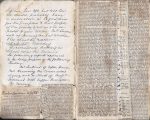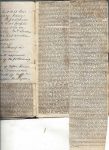Stevens 1885-04-28
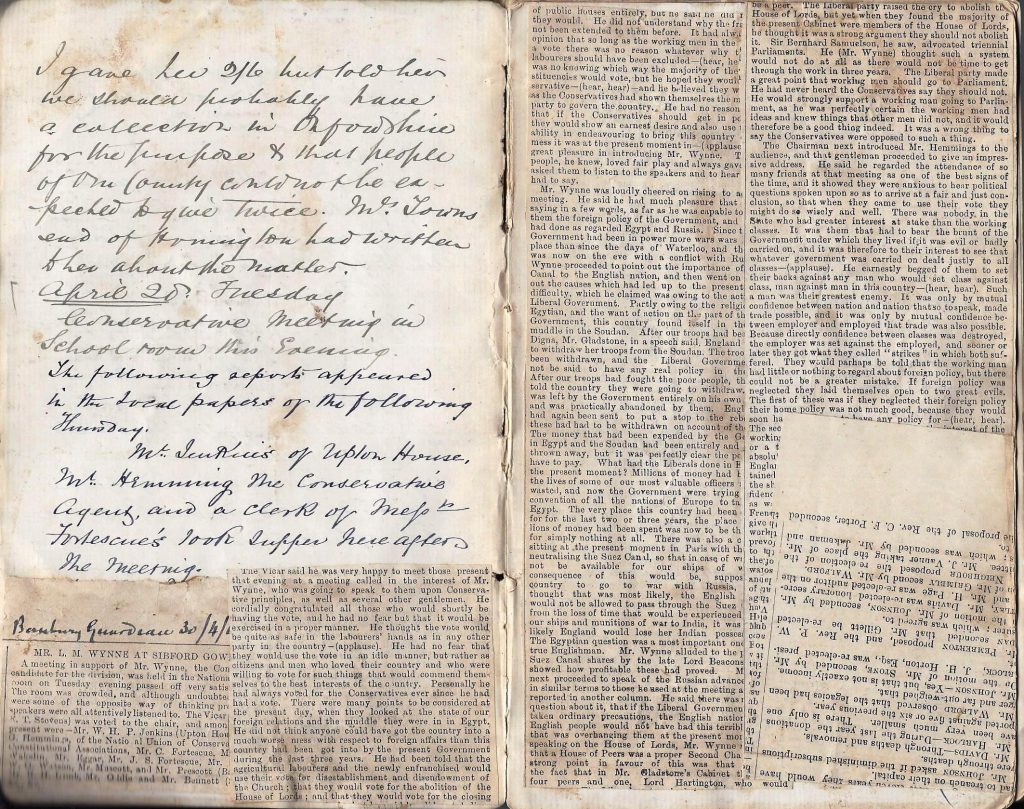
Conservative meeting in School room this evening. The following report appeared in the local papers of the following Thursday.
Mr Jenkins of Upton House, Mr Hemming the Conservative Agent, and a clerk of Messrs Fortescue’s took supper here after the meeting.
(First) cutting from the Banbury Guardian, 30 April 1885:
MR. L. M. WYNNE AT SIBFORD GOWER
A meeting in support of Mr Wynne, the Conservative candidate for the division, was held in the National Schoolroom on Tuesday evening passed off very satisfactorily. The room was crowded, and although undoubtedly there were some of the opposite way of thinking present speakers were all attentively listened to. The Vicar (the Rev. E.T. Stevens) was voted to the chair, and amongst those present were—Mr. W. H. P. Jenkins (Upton House) Mr. G. Hemmings of the National Union of Conservative and Constitutional Associations, Mr. C. Fortescue, Mr. W. T. Wakelin, Mr. Eggar, Mr. J. S. Fortiscue, Mr. Morgan, W. G. Watson, Mr. Muscott, and Mr. Prescott (Banbury), Mr. R. H. Lamb, Mr. Oddie and Mr. Bennett (Sibford), &c., &c.
The Vicar said he was very happy to meet those present that evening at a meeting called in the interest of Mr. Wynne, who was going to speak to them upon Conservative principles, as well as several other gentlemen. He cordially congratulated all those who would shortly be having the vote, and he had no fear but that it would be exercised in a proper manner. He thought the vote would be quite as safe in the labourers’ hands as in any other party in the country—(applause). He had no fear that they would use the vote in an idle manner, but rather as citizens and men who love their country and who were willing to vote for such things that would commend themselves to the best interests of the country. Personally he had always voted for the Conservatives ever since he had had a vote. There were many points to be considered at the present day, when they looked at the state of our foreign relations and the muddle they were in in Egypt. He did not think anyone could have got the country into a much worse mess with respect to foreign affairs than this country had been got into by the present Government during the last three years. He had been told that the agricultural labourers and the newly enfranchised would use their vote for disestablishment and disendowment of the church; that they would vote for the abolition of the House of Lords; And that they would vote for the closing of public houses entirely, but he said he did not think they would. He did not understand why the franchise had not been extended to them before. It had always been his opinion that so long as the working men in the towns had a vote there was no reason whatever why the country labourers should have been excluded—(hear, hear). There was no knowing which way the majority of the rural constituencies would vote, but he hoped they would vote Conservative—(hear, hear) —and he believed that they would do so as the Conservatives had shown themselves the most capable party to govern the country. He had no reason to suppose that if the Conservatives should get in power again they would show an earnest desire and also use their great ability in endeavouring to bring this country out of the mess it was at the present moment in—(applause). He had great pleasure in introducing Mr. Wynne. The Sibford people, he knew, loved fair play and always gave it, and he asked them to listen to the speakers and to hear what they had to say.
Mr. Wynne was loudly cheered on rising to address the meeting. He said he had much pleasure that evening in saying in a few words, as far as he was capable to explain to them the foreign policy of the Government, and what they had done as regarded Egypt and Russia. Since the present Government had been in power more wars had taken place and since the days of Waterloo, and the country was now on the eve with a conflict with Russia. Mr. Wynne proceeded to point out the importance of the Suez Canal to the English nation, and then went on sketch out the causes which had led up to the present Egyptian difficulty, which he claimed was owing to the action of the Liberal Government. Partly owing to the religion of the Egyptian, and the want of action on the part of the Liberal Government, this country found itself in the present muddle in the Soudan. After our troops had beaten Osma Digna, Mr. Gladstone, in a speech said, England was going to withdraw her trips from the Soudan. The troops had not been withdrawn, and the Liberal Government could not be said to have any real policy in the matter. After our troops had fought the poor people, the Liberals told the country they were going to withdraw. Gordon was left by the Government entirely on his own resources and was practically abandoned by them. English troops had again been sent to put a stop to the rebellion, but these had to be withdrawn on account of the climate. The money that had been expended by the Government in Egypt and the Soudan had been entirely and absolutely thrown away, but it was perfectly clear that people would have to pay. What had the Liberals done in Egypt up to the present moment? Millions of money had been spent, the lives of some of our most valuable officers and troops wasted, and now the Government were trying to make a convention of all the nations of Europe to take care of Egypt. The very place this country have been contending for for the last two or three years, the place where millions of money had been spent was now to be thrown away for simply nothing at all. There was also a Commission sitting at the present moment in Paris with the object of neutralising the Suez Canal, so that in case of war it would not be available for our ships of war. The consequence of this would be, supposing this country to go to war with Russia, and he thought that was most likely, the English war ships would not be allowed to pass through the Suez Canal, and from the loss of time that would be experienced in getting our ships and munitions of war to India, it was extremely likely England would lose her Indian possessions also. The Egyptian question was a most important one for every true Englishman. Mr. Wynne alluded to the purchase of Suez Canal shares by the late Lord Beaconsfield, and showed how profitable these had proved. Mr. Wynn next proceeded to speak of the Russian advance on India in similar terms to those he used at the meeting at Bloxham reported in another column. He said there was no possible question about it, that if the Liberal Government had only taken ordinary precautions, the English nation and the English people would not have had this terrible calamity that was overhanging them at the present moment. In speaking on the House of Lords, Mr. Wynne maintained that a House of Peers was a proper Second Chamber. A strong point in favour of this was that shown by the fact that in Mr. Gladstone’s Cabinet there were four peers and one, Lord Hartington, who would be a peer. The Liberal Party raised the cry to abolish the House of Lords, but yet when they found the majority of the present cabinet where members of the House of Lords, he thought it was a strong argument they should not abolish it. So Bernhard Samuelson, he saw, advocated triennial Parliaments. He (Mr. Wynne) thought that such a system would not do at all as there would not be time to get through the work in three years. The Liberal Party made a great point that working men should go to parliament. He had never heard the Conservatives say they should not. He would strongly support a working man going to Parliament, as he was perfectly certain the working men had ideas and knew things that other men did not, and it would therefore be a good thing indeed. It was a wrong thing to say the Conservatives were opposed to such a thing .
The chairman next introduced Mr. Hemmings to the audience, and that gentlemen preceded to give an impressive address. He said he regarded the attendance of so many friends at that meeting as one of the best signs of the time, and it showed they were anxious to hear political questions spoken upon so as to arrive at a fair and just conclusion, so that when they came to use their vote they might do so wisely and well. There was nobody in the State who had great interest at stake than the working classes. It was them that had to bear the brunt of the Government under which they lived if it was evil or badly carried on, and it was therefore to their interest to see that whatever government was carried on dealt justly to all classes—(applause). He earnestly begged of them to set their backs against any man who would set class against class, man against man in this country—(hear, hear). Such a man was their greatest enemy . It was only by mutual confidence between nation and nation that so to speak, made trade possible, and it was only by mutual confidence between employer and employed that trade was also possible. Because directly confidence between classes was destroyed, the employer was set against the employed, and sooner or later they got what they called “strikes” in which both suffered. They would perhaps be told that the working man had little or nothing to regard about foreign policy, but there could not be a greater mistake. If foreign policy was neglected they laid themselves open to two great evils. The first of these was if they neglected their foreign policy their home policy was not much good, because they would soon have no home to have any policy for—(hear, hear). The second reason was because it was to the interest of the working men that a good foreign policy—not a reckless one or a too cautious one—should be maintained. It was absolutely necessary to the welfare of all classes that England should keep her customers. The speaker maintained that one of the causes of the present depression in the shipping trade was because the merchants had no confidence that the Government would protect their interests, as was shown by the seizure of cargoes of rice by the French at Hong Kong. Mr. Hemmings then proceeded to give similar statistics showing how the interests of the working classes had been neglected, as those he gave the previous evening at Adderbury, and then went on to allude to the attitude of affairs with Russia. As working men they had a vital interest in the question of peace or war. War paralysed trade an meant an increased taxation, and that meant an increase in the cost of produce of their Labour. In answer to the charge that was made against the Conservatives of causing all the wars which had taken place during Mr. Gladstone’s Administration, Mr. Hemmings read an extract from the Queen’s speech when Mr. Gladstone came in power wherein it was stated: “The cordial relations which I hold with all the Powers of Europe will, I trust, enable me to carry out, in concert with them, the Treaty of Berlin.” One of the outcries of Liberals was for an alteration in the land laws, and the Conservatives had already proved themselves the friends of the people by giving it. They were told that one of the planks of the Liberal platform was to be the abolition of the law of entail and primogeniture, but that had already been done by the Tories. The Conservatives protected the rights of the people to the commons land by the Act of 1876. The cheap transfer of land was another point the Liberals advocated, and it was a thing he had no objection to, and in this also the Conservatives had set the example. Under the present ministry there had been more wars than under any ministry since the days of Waterloo, and of their retrenchment they had spent more money than any Government since the Crimea, during which time Mr. Gladstone was in power, and as to reform they knew what the Government had given them and so did he. (A voice, “They gave us the franchise.”) Mr. Hemmings replied—Only some of it. It was the Conservatives who gave the working men the vote in towns, and the Liberals and Conservatives combined who had given the labourers the vote in counties. He saw “a chiel among them taking notes,” and he hoped that gentleman would put some questions after he had done speaking. In conclusion comment Mr. Hemming said those who now possess the vote were charged with the Government of this country, and they could either make it or mar it. They could do evil to themselves or good, and he earnestly begged them to use that by remembering the history and traditions of the past, so that they might hand down to the children who should come after them an empire as good, as grand, as pure, and as glorious as that which their forefather had built up for them. And thus they would give them that which they had received themselves—institution and a Constitution which was an example and pattern for the world.
Several questions were asked by Mr. Oddie, of Sibford and answered to the satisfaction of many of the audience by Mr. Hemmings.
The meeting closed with a vote of thanks to the Vicar for presiding.
Cutting from the Banbury Advertiser, 30 April 1885:
MR WYNNE’S CANDIDATURE.
Continued from Page 8.
MEETING AT SIBFORD GOWER.
The electoral campaign was opened in the Sibford district on Tuesday, by a meeting held in the Church School Room in support of the Conservative cause. The room was well filled with an orderly and attentive audience, and, though there was no lack of difference of opinion, and the remarks were subjected to a fair amount of running comment, yet there was none of the meaningless noises and interruptions in which small knots of the hearers have indulged in other villages. Certainly the Vicar, The Rev. E. T. Stevens, who presided, has reason to be proud of the good sense of his parishioners, and of the way in which they help him to conduct a public meeting. He introduced to them
Mr. WYNNE, who proceeded at some length to criticise the foreign policy of the Liberal Government. Referring to Egypt, Mr. Wynne said that all the valuable lives had been thrown away, all the money had been thrown away, for simply nothing at all if we were to ask, by means of the Convention. Other nations to help us to govern the country. If the neutrality of the Suez Canal is determined by the commission now sitting in Paris, England will have either to send her troops and supplies to India round by the way of the Cape, or else we shall be obliged to disembark the troops at Alexandria and re ship them at Suez. With regard to the Canal shares, which he would remind them that far-seeing statesman Lord Beaconsfield bought, Mr. Gladstone had said you were foolish enough to buy those shares, and to complicate a financial operation of a difficult description. Now he thought if Mr. Gladstone had one great gift it was that of finance, which in one way might be defined as the science of human life, and yet the Canal shares, the purchase of which Mr. Gladstone condemned, cost the country pounds £4,000,000, and to-day they were worth in the markets of Europe £10,000,000. (Cheers.) Now turning to another point, he reviewed our complications with Russia. The great desire of that nation, he thought to be, to obtain possession of Constantinople, and to work her way to the seaboard of the Indian Ocean; and for years and years she had been getting nearer India. By the aid of a map, Mr. Wynne then traced the territorial acquisition of Russia during the past thirty years, and pointed out her fortified positions eastward, and her means of communication over those areas. Now he said she stood menacing the gates of Herat, having traversed 700 miles in the course of six years, and it was worthwhile to recall Mr. Gladstone’s statement that he had no fear of Russia’s territorial aggression in Asia, such were old women’s tales; yet in 1885, Mr. Wynne said, we were absolutely on the Eve of a war with Russia. Herat at was admitted to be a most important point, situate in the midst of a fertile country, in which large armies could be fed and retained; it was the key to India. The present Government when they came into power, not only stopped the war with Afghanistan, but also pulled up and sold the material of a railway which the Conservatives had been constructing from Quetta to Candahar, are railway which it would now be necessary to re-construct. Had the Liberal Government only taken proper precautions, Russia would not have been allowed to get as far as she had done, for she thought that, by exciting internal discontent and strife in India, our armies might be so occupied that she could then seize the coveted prize Constantinople. Turning now to home questions, Mr. Wynne said their Vicar has spoken to them for a short time upon the Liberal cry for the abolition of the House of Lords. The real question at issue was how a second chamber should be chosen, for in all Governments chosen by the people, a second chamber was essential to check check the action of the other. He thought they would not like the sovereign to choose the members of the chamber, nor would it do for them to be elected by the people, else the majority of the chamber would necessarily be the majority of the other. The only one which could ensure any practical purpose was the House of Lords. He thought it was a great mistake to suppose the House of Lords to be wholly a hereditary chamber, for many of the peers had risen from the people. Their great chief, Lord Beaconsfield, and Lord Cairns had sprung from the people; also Lord Wolseley, their general, and Lord Tennyson, the poet. The speaker of the House of Commons, when he resigns his office, goes into the House of Lords by right. The Cabinet, he stated, was opposed of twelve or thirteen members who need not have necessity be peers, yet members of the House of Lords form the majority of Mr. Gladstone’s cabinet. Now with regard to the working men going to Parliament, he could not see why they should not go. (A voice : Who could be better than a working man.) Mr. Wynne said if the speaker would only come on to the platform he would be of great service to the Conservative cause. He strongly wished that working men should go to Parliament, and if that class lacked to subscribe to maintain their representative, he for one should be very glad. Mr. Wynne resumed his seat after thanking the audience for their great attention, and especially thanking his friend, his echo, amongst them, who had helped him so much. (Loud applause.)
Mr. HEMMINGS, in the course of his speech, spoke of the value of learning to use a vote wisely and well, for political education, he said, must form a part of the education of every man who would wish to do his work well. It was the labouring class, he remarked, who had to bear the brunt if the government was badly carried on. Especially he wished to caution them against those who would set class against class, and society against society, for if one class was not prosperous in the state, sooner or later that class affected other classes. He thought that only by confidence between employer and employee was work possible. They would be told, he said, as working men, that they had little or nothing to do with foreign policy, but certainly if it was neglected home policy would be of no use, because they would soon have no home for a policy. Napoleon had well said that we were a nation of shopkeepers, and it would be apparent that if we did not keep our customers the till would soon be empty. From India alone, he remarked, we derived a profit of £60,000,000 ; it was the largest market we had, and took about one seventh of our products. If, then, those markets were closed against us, where were we, and if Russia gets a seaboard near India she not only competes with us for the carrying trade, but also for the trade which is yours and mine. Now with regard to trade, the Liberals had declared from month to month that there was no depression, but at last they could deny it no longer, and in Birmingham alone, the home of the caucus, there were 20,000 men out of work. He pointed out also the enormous increase of emigration during the time when the Liberal administration was in power as compared with the emigration during Conservative times. A Government, he said, pledged to peace, had made more wars than any other since the days of Waterloo. Pledge to reform, he asked what had the Government given them. (A Voice : The franchise.) The Conservatives, he stated, gave the franchise to the working men in the town, and Conservatives and Liberals together have given the franchise to the country. In conclusion he reminded them that now they possessed the vote they could make or mar the country as they willed. They would, he hoped, hand down to their children’s children an inheritance as free and glorious as their fathers had given to them. (Applause.)
Mr. R. B. ODDIE said he did not think Mr. Gladstone chose the members of his cabinet because they were lords. As a working man he would be pleased to have the power to use his vote for the first time in his life ; He thought the Conservatives had done all they could to retard the working man finding a place in Parliament.
These statements were applied to both by Mr. Wynne and Mr. Hemmings and with a vote of thanks to the Chairman, the meeting separated.
(Second) cutting from the Banbury Guardian, 30 April 1885:
THE TORY MEETING AT SIBFORD.
To the Editor of the BANBURY GUARDIAN.
SIR,—On Tuesday evening a meeting was held at Sibford at which the Conservative candidate, Mr Wynne, and Mr Hemmings delivered addresses. Mr Wynne confined himself mainly to a criticism of the foreign policy of the Government in relation to Egypt, Russia, Central Asia, and India.
Mr. Hemmings who from the voluminous notes from which he spoke, had evidently drawn largely upon the archives of the Carlton Club, contented himself with a parade of the visionary triumphs of Tory reform in domestic legislation.
The meeting was described by Mr. Wynne as being one of the most harmonious he had held during the campaign ; yet, strange to say, no resolution in favour of the Conservative cause or of Mr. Wynnes’s efforts to aid it was passd.
The explanation of this probably lies in the fact that it had become known that if occasion offered an amendment approving the candidature of Sir B. Samuelson would be forthcoming, and that this would be carried by an overwhelming majority.
The meeting relied for its “harmoniousness” upon a foreign contingent imported by the promoters of the meeting, whose ready applause was not unaccompanied with yawns of very suggestive magnitude and duration.
Full well these laughed with counterfeited glee,
At all the jokes whose points they couldn’t see.
I am yours truly, E. Y. T.
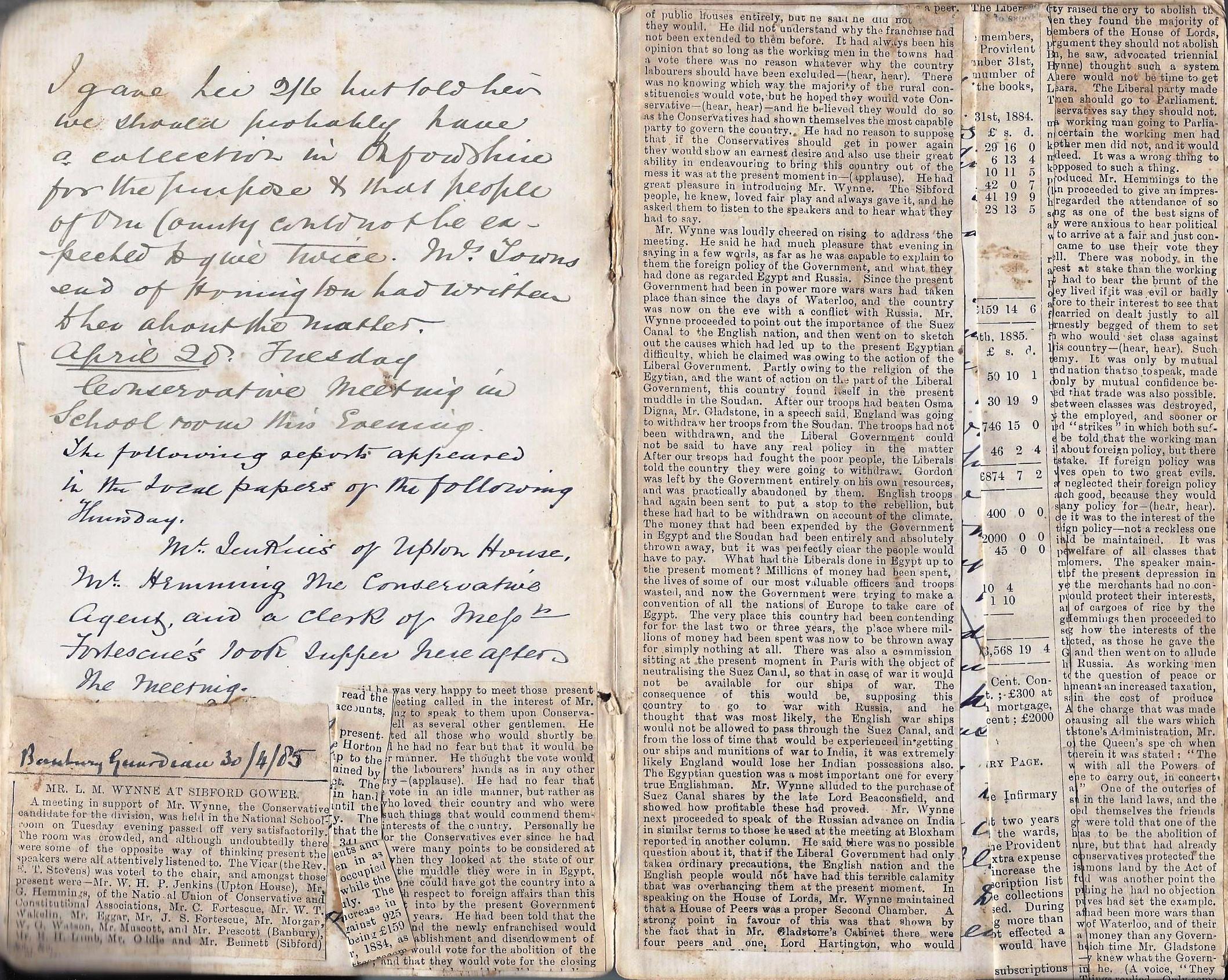
27 Apr 1885
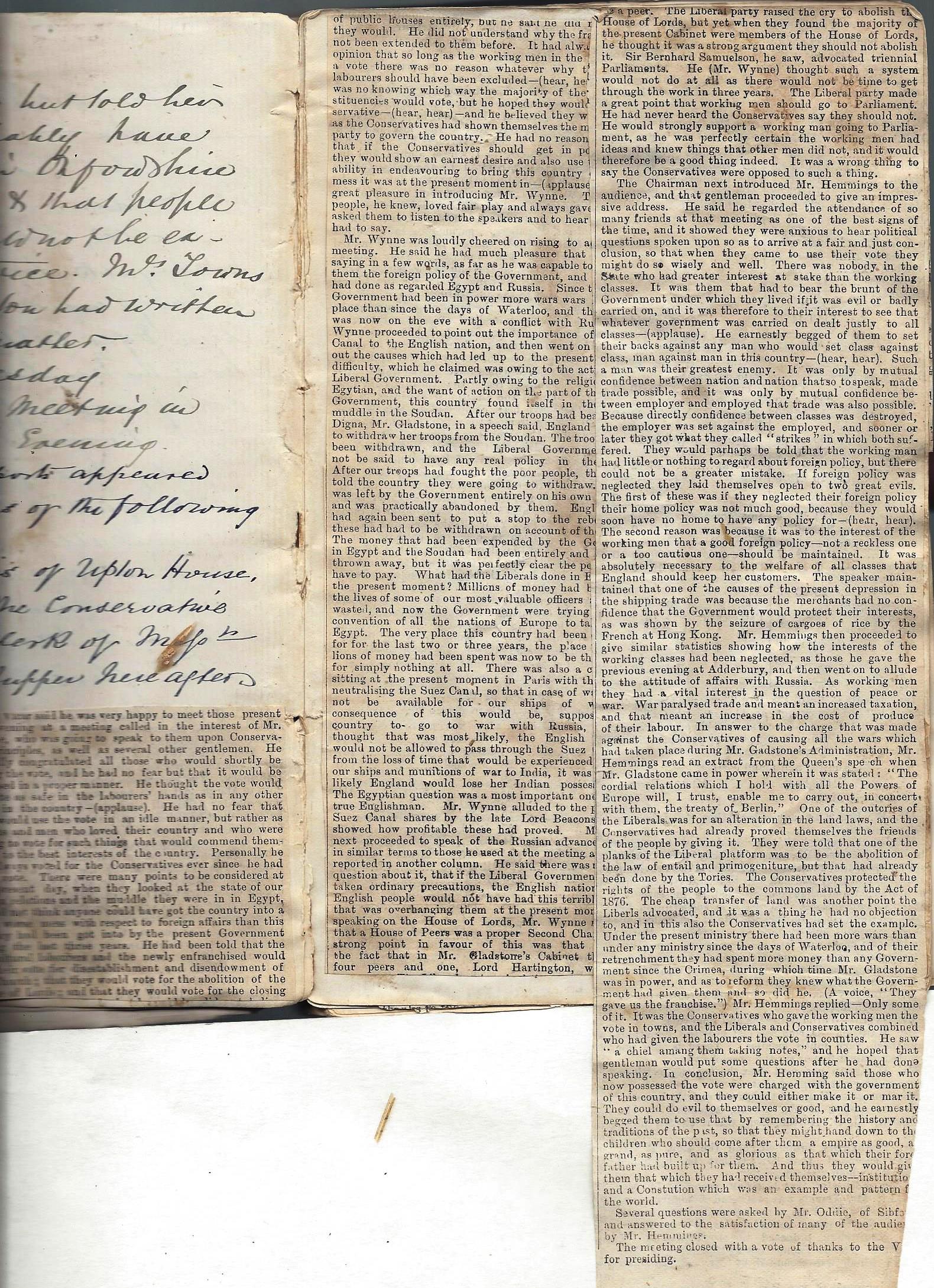
27 Apr 1885

Cutting 2 from the Banbury Guardian of 30 April 1885, part 1 of 2
30 Apr 1885
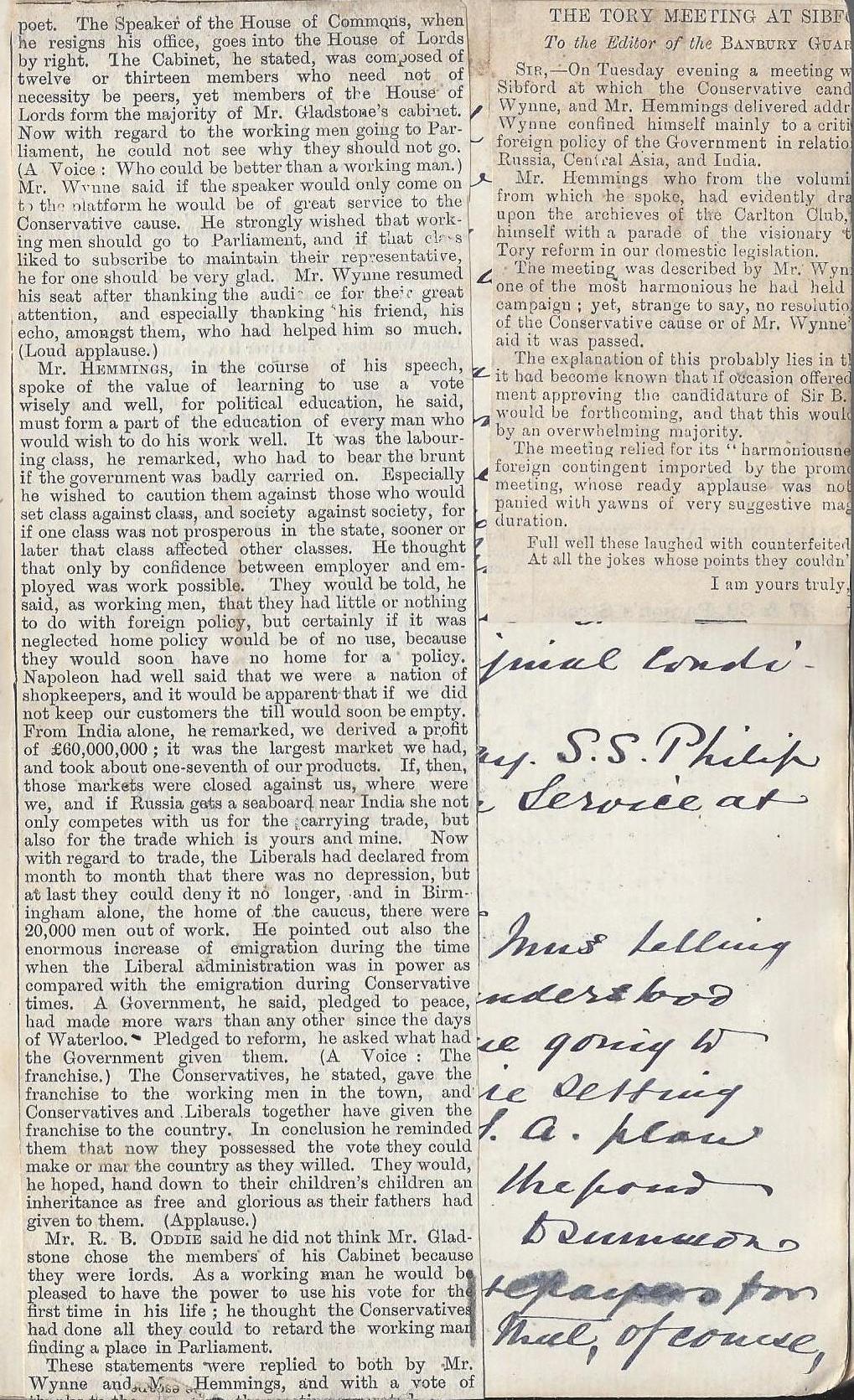
Cutting 2 from the Banbury Guardian of 30 April 1885, part 2 of 2
30 Apr 1885
